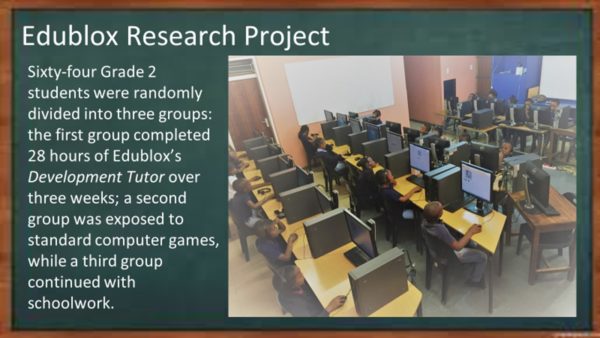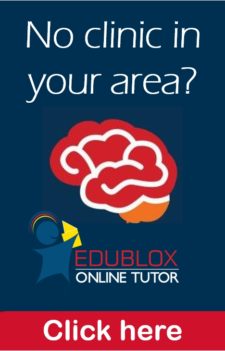
A recent collaborative study between Edublox, the University of Pretoria (UP) and a primary school in Pretoria CBD is paving the way to show how Edublox Online Tutor can contribute in the process of developing auditory memory. The study is currently being analysed as a post hoc research project by Naseehat Dawood as part of her master’s degree in research psychology under the guidance of Professor David Maree, former Head of the Department of Psychology at UP.

Sixty-four Grade 2 students were randomly divided into three groups: the first group completed 28 hours of Development Tutor over three weeks; a second group was exposed to standard computer games, while a third group continued with schoolwork. The pre- and post-assessments were conducted by independent speech and language therapists using the Test of Auditory Processing Skills (TAPS-3). Three sub-tests were used to assess auditory memory for numbers, words and sentences. Following the project, Edublox supplied access to Development Tutor to all Grade 2’s to adhere to ethical research practices.
Formal analysis of the data and processing of the results by Ms. Dawood is underway using the SPSS software platform.
Preliminary results show that the auditory memory of the Edublox group improved significantly, especially auditory memory for numbers. The ‘Number Memory Forward’-sub-test is designed to show how well a student can retain simple sequences of auditory information. Number sequences of increasing length are read to the student, who is to repeat them. Testing is discontinued when the student makes three consecutive mistakes.
Previous research on the Edublox programs as a cognitive development intervention has indicated significant improvement in other areas that contribute in the learning process. This includes a 2013 study by Dr. Jaidan Mays, at the time an M.Tech. student at the University of Johannesburg. Using the Test of Visual Perceptual Skills as measure, he found a significant improvement in visual memory – from 6.2 to 7.5 years – following an intensive one-week program of 22.5 hours.
A one-week Edublox program was also presented in Singapore to 27 learners, ages 10 to 12; the control group comprised of 25 students. The results of the pre- and post-tests were analysed by the Centre for Evaluation and Assessment in the Faculty of Education at UP. Results of the study showed a significant improvement in focused attention, which is the ability to selectively concentrate on one aspect of the environment while ignoring other things.
“Edublox is committed to assist children to read, learn, achieve and succeed by improving their cognitive abilities,” says managing director, Henk du Plessis. “We are pleased to add the encouraging research results about auditory memory to our current research archive as further evidence that the cognitive skills exercises in our program are effective tools in helping children achieve academic success.”





